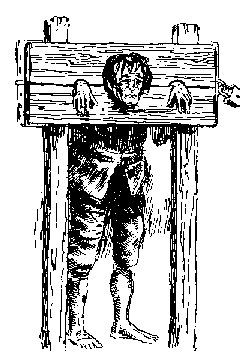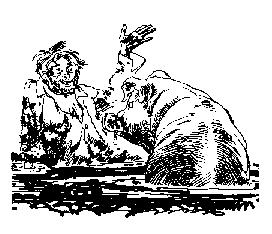Home
1. Legally
 Let us not be afraid to think in legal categories, for the whole of the Hebrew Scriptures moves in this atmosphere. God is Judge and Lawgiver. He is the God of law and order. Unlike the unpredictable gods of the heathen, we can depend on Him to act in harmony with His own law of eternal rectitude. Justification, that great Pauline word, is a word of the law court. God is not only in the business of saving sinners, but in the business of vindicating His law. Paul argues that our salvation is grounded in law and justice as much as in grace and mercy (see Rom. 3:24-26). Our own consciences demand justice and cannot be pacified unless God's fellowship with us is grounded on justice.
Let us not be afraid to think in legal categories, for the whole of the Hebrew Scriptures moves in this atmosphere. God is Judge and Lawgiver. He is the God of law and order. Unlike the unpredictable gods of the heathen, we can depend on Him to act in harmony with His own law of eternal rectitude. Justification, that great Pauline word, is a word of the law court. God is not only in the business of saving sinners, but in the business of vindicating His law. Paul argues that our salvation is grounded in law and justice as much as in grace and mercy (see Rom. 3:24-26). Our own consciences demand justice and cannot be pacified unless God's fellowship with us is grounded on justice.
God was not play-acting at Calvary. If He were not bound by His own law of eternal rectitude, then Christ need not have died. Calvary was not a legal fiction. It proves that divine law is inexorable. It gives us a legal (lawful) basis of salvation.
We accept the legal principle in the most sacred of human relationships. A woman who ignores a legal relationship and tries to establish a relationship with a man by experience alone is prostituting a fundamental law of life. In the Revelation of St. John, Babylon (which represents all false religion) is called a harlot (Rev. 17:5). Babylon is every system that tries to establish a relationship with God on the basis of experience. Sanctification is living a life of fellowship with God. Justification is its legal basis, and without justification no fellowship can exist.
Let us examine this legal basis of sanctification from the negative aspect of sin and from the positive aspect of holiness.
a. In the Matter of Sin. It has often been said that justification is deliverance from the guilt of sin, while sanctification is deliverance from the power of sin. But we must not split them up so that we would conceive of a man enjoying one blessing without the other. This often happens in "holiness" theology where it is postulated that there are two types of Christians — the elect, who are delivered from the guilt of sin, and the very elect, who are also delivered from the power of sin; or those who only (?) know Christ as Saviour and those who also know Christ as Lord. The Bible knows nothing of this kind of separation between justification and sanctification.
It is thoroughly mischievous in its results. If it does not lead to spiritual pride among those who imagine they are out of Romans 7 and into Romans 8, it leads to the Christ-denying notion that a man can be saved from the guilt of sin and yet continue to wallow in its pollution — as if sanctification were optional as far as salvation is concerned.
 There is a direct relationship between the guilt of sin and the power of sin. If the guilt of sin is removed, the power of sin is broken. This is Paul's point in Romans 6:14: "For sin shall not have dominion over you: for ye are not under the law, but under grace." That is to say, as long as a man is "under the law," sin will be king over him, and he will be forced to surrender to its reign. But if he comes under grace, sin has no more power to rule and tyrannize.
There is a direct relationship between the guilt of sin and the power of sin. If the guilt of sin is removed, the power of sin is broken. This is Paul's point in Romans 6:14: "For sin shall not have dominion over you: for ye are not under the law, but under grace." That is to say, as long as a man is "under the law," sin will be king over him, and he will be forced to surrender to its reign. But if he comes under grace, sin has no more power to rule and tyrannize.
In Romans 7 Paul goes on to explain this mystery of the relationship between the law and sin's power. The strength of sin is not in sin itself, for "the strength of sin is the law." 1 Cor. 15:56. The law — yes, the holy, just and good law of God — binds a man to the service of sin by the power of omnipotent justice. Sin is the master ("the husband") that man chose to serve, and the law binds him in this relationship just like a woman is bound by the law to the husband of her choice. As the good law keeps the criminal in jail, so it is God's law which binds the sinner to the miserable service of sin. In fact,
". . . sin, taking occasion by the commandment, wrought in me all manner of concupiscence." Rom. 7:8. That is to say, sin gets its legal right from the law to take control of any man who is under the law and work in him all manner of evil desires.
Freedom from the power of sin is only found in coming to terms with the law of God. As long as we are in debt to its righteous demands, we are "under the law" and will surely be kept in the prison house of sin. But as soon as faith takes hold of Christ's doing and dying as ours, we are justified, or set right before the law. Indeed, that is the reason why the law kept us shut up — until "faith came" (see Gal. 3:23, 24). When by faith in Christ we stand before the law as forgiven and righteous, the law no longer binds us to that old master. Sin has no more power to hold us. Justification makes us (legally) free not to serve sin. Deliverance from sin's power is therefore the inevitable result of deliverance from sin's guilt.
 b. In the Matter of Holiness. It has often been said (and truly) that justification is our title to heaven. We must not forget, however, that the life of heaven begins in the life of holiness here and now. Sanctification is glorification begun. It is the life of heaven in the seed, the first fruits, or down payment, of the immortal inheritance (Rom. 8:23; Eph. 1:14). Heaven is access into God's presence. It is to partake of His holiness and to participate in His life. But this participation in the holiness of God begins here with those who "have tasted of the heavenly gift, and were made partakers of the Holy Ghost, and have tasted the good Word of God, and the powers of the world to come." Heb. 6:4, 5.
b. In the Matter of Holiness. It has often been said (and truly) that justification is our title to heaven. We must not forget, however, that the life of heaven begins in the life of holiness here and now. Sanctification is glorification begun. It is the life of heaven in the seed, the first fruits, or down payment, of the immortal inheritance (Rom. 8:23; Eph. 1:14). Heaven is access into God's presence. It is to partake of His holiness and to participate in His life. But this participation in the holiness of God begins here with those who "have tasted of the heavenly gift, and were made partakers of the Holy Ghost, and have tasted the good Word of God, and the powers of the world to come." Heb. 6:4, 5.
In the Fall man lost all those rights and privileges. A sinner has no right to participate in God's life of holiness. Yet Christ, and Christ alone, has won for man this right of access: "... as many as received Him, to them gave He the right, or privilege [margin], to become the sons of God [to be partakers of His divine nature — 2 Pet. 1:4], even to them that believe on His name. . . " John 1:12. Faith justifies, and being justified, we have legal access (rights and titles) to enter the way of holiness.
Along this route to "the celestial city" many trials lie in wait to purify our faith. There are giants to beat us, nets to catch us, and crafty men to beguile us. And along the King's highway travel such saints as "Ready to Halt," "Little Faith" and poor "Christian," who runs afoul of trouble times without number. In such times of temptation and human weakness, how could we assure our hearts before God unless we could look to our title found in the righteousness of the One who represents us at God's right hand? How easily faith would falter and we would stand disarmed in the midst of our enemies if, being challenged for our right to be traveling the road of sanctification, we put our hand (like"Ignorance") into our own bosom to find some grounds to be among the saints. Happy is the man who, in the hour of test and trial, can look outside to atonement instead of inside to attainment.
Though Satan should buffet,
Though trials should come,
Let this blest assurance control,
That Christ hath regarded my helpless estate,
And hath shed His own blood for my soul.
Thus, justification is the legal (lawful) basis of sanctification. It makes holiness possible by removing sin's lawful right to rule us and by restoring our lawful right to walk in the way of holiness.